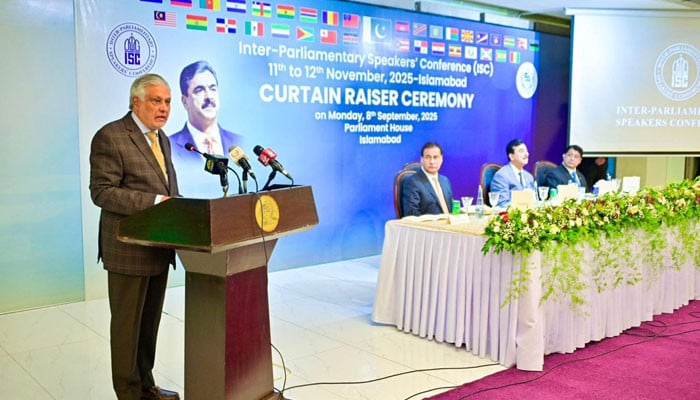ISLAMABAD: Pakistan Monday said it will no longer remain passive as it continues to be among the top 10 hardest countries hit by climate change.
“We are committed to being a voice for the vulnerable and a driver of collective climate action,” said Deputy Prime Minister and Foreign Minister Ishaq Dar. He pointed out that Pakistan is once again facing the ravages of devastating floods that have displaced millions, inflicted colossal human and economic losses, and posed a serious challenges to our recent gains in sustainable development.
“It is unfortunate that, despite contributing less than one percent to global emissions, Pakistan continues to be among the top 10 hardest hit by climate change,” he said. Dar was speaking at the Curtain Raiser Ceremony – Inter-Parliamentary Speakers’ Conference (ISC) in which he reaffirmed Pakistan’s commitment to multilateralism, parliamentary diplomacy and peaceful resolution of disputes in accordance with the principles of the United Nations Charter.
He highlighted Pakistan’s election to the United Nations Security Council for the 2025–2026 term, emphasising the nation’s leadership in advancing climate justice and its advocacy for reforming the global financial architecture.
He stressed that the ISC reflects bipartisan support and provides a vital platform for dialogue, trust-building and cooperation between the executive and legislative branches. Long-standing unresolved disputes – from Kashmir to Palestine – continue to pose a threat to regional and international peace and security, he added. “There is an increasing tendency towards resorting to unilateralism and defiance of the UN Charter. We are witnessing the adverse impacts of climate change and climate-induced disasters as we speak. The structural deficiencies in the international goals and financial system are aggravating global inequalities and poverty, and undermining our developmental goals,” he pointed out.
Dar suggested that parliamentary diplomacy, in the form of the ISC, can play an important role in this regard by promoting dialogue, mutual respect and engagement. “Such initiatives reflect Pakistan’s broader foreign policy, which is rooted in the principles of the UN Charter, sovereign equality of states, non-interference, right to self-determination, and the peaceful settlement of disputes. This spirit of the ISC aligns with Pakistan’s commitment to the centrality of multilateralism in providing a framework for trust-building and cooperation, which are essential for lasting peace and development,” he added.
